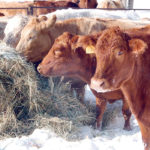For the second winter in a row pharmaceutical companies are hearing lots of complaints about scratching cattle and hair loss. This means that producers and veterinarians may need to change how they routinely treat for lice. First, a positive diagnosis is important. We may handle biting lice, sucking lice and chorioptic mange differently and many […] Read more
 Livestock Management
Livestock Management
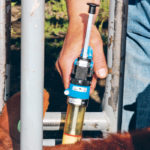
Cattle’s vaccination history important
Producers are advised to talk with a veterinarian once a year about vaccination programs to get the best results
RED DEER — There are different kinds of vaccines on the market and it is important that producers know what their cattle have received in the past. “It is really important to know the history of animals and what they have had in their lives when you are vaccinating mature animals,” said veterinarian Craig Dorin […] Read more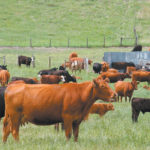
Cattle with parasites graze less efficiently
Research has found that treating cattle for worms can potentially improve their productivity in the pasture
Cattle infected with parasites spend less time grazing and more time idling in the pasture, leading to lower weight gains compared to animals treated to eliminate parasites. Though the study led by Andrew Forbes was published in Veterinary Parasitology in 2004, its findings emphasize the benefits of parasite treatment in cattle to potentially improve productivity. […] Read moreBison producers watch new livestock transportation rules
CAMROSE, Alta. — Bison producers are focusing on transportation issues, potential drought and market expansion as top priorities as they head into spring. Speaking during the Wildrose Bison Convention March 15 in Camrose, Terry Kremeniuk, executive director of the Canadian Bison Association, said new transportation rules introduced by the federal government could be problematic. “They […] Read more
Bovine leukosis increasing in prevalence
Veterinarian says dairy farms are more prone to the easily managed disease, but it likely also exists on beef operations
Some veterinarians are hoping they can help producers better manage bovine leukosis, a disease that can rob productive animals on dairy and beef farms. The disease stems from a viral infection that’s easily spread through blood, milk and colostrum, affecting the immune system and potentially causing tumours. Frank van der Meer, a veterinarian and associate […] Read moreRanchers hopeful for changes to compensation rates
CLARESHOLM, Alta. — Alberta ranchers can get compensation when a grizzly bear, black bear, wolf or cougar kills one of their animals, but the path to obtaining that money is not always smooth. Has the type of predator that killed the animal been confirmed? Were the remains inspected by a Fish and Wildlife officer? Was […] Read more
Worms can survive winter
Conventional thought was that common species of roundworm cattle parasites are killed during the cold prairie winters. Not so, it appears. Agriculture Canada research scientist Doug Colwell says studies show about five percent of common roundworm species survive winter and are available to be ingested by cattle as soon as turnout in spring. He is […] Read more
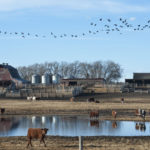
Spring weather may swing Western Canadian feed markets
Winnipeg – Spring weather conditions have the potential to swing feed grain markets in Western Canada over the next few weeks, although prices generally remain steady for the time being. “Spring is here, and as the snow melts it creates mud, road bans and all that lovely stuff,” said Brandon Motz of CorNine Commodities in […] Read more
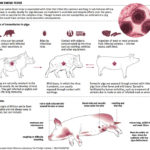
Canada imports pork from Poland, despite African swine fever
If the disease appears in Canada, countries could ban imports of Canadian pork and cause billions in economic damage
Canada continues to import pork from Poland, even though the country has had hundreds of cases of African swine fever. For the first 11 months of 2018, Canada imported more than $25 million worth of pork from the European country, based on Agriculture Canada data. Infected meat is the primary vector of African swine fever, […] Read more
Feds take African swine fever action
Extra sniffer dogs will look for illegal meat products and the CFIA makes zoning plans in case disease found here
There will be more dogs sniffing luggage and passengers at Canadian airports in coming years as Agriculture Canada and the Canadian Food Inspection Agency seek to block African swine fever. Federal Agriculture Minister Marie-Claude Bibeau announced plans March 14 to add 24 sniffer dogs to the 15-dog complement already on the job. The increase will […] Read more
 Livestock Management
Livestock Management